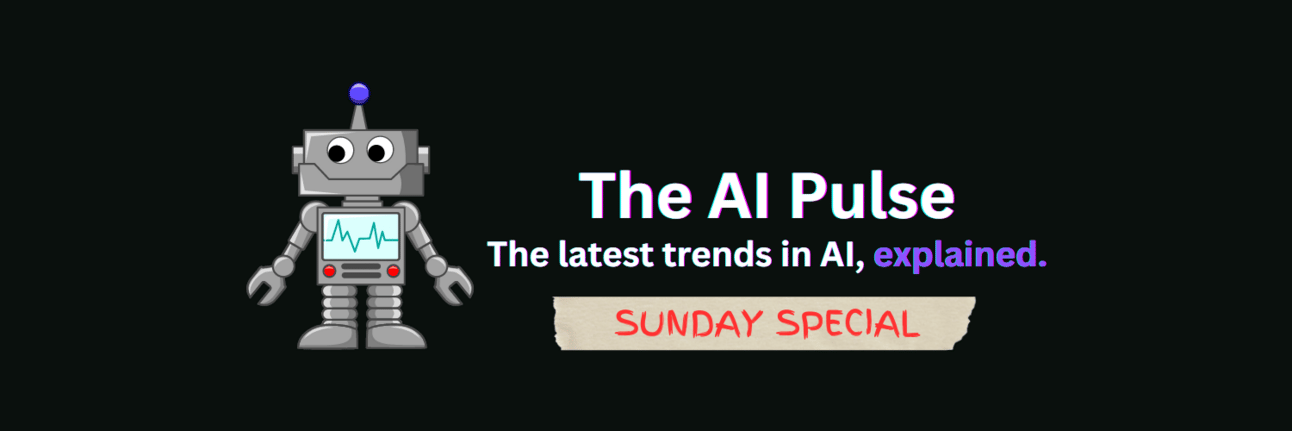
Welcome back AI prodigies!
In today’s Sunday Special:
⚙️AI 1.0: Tool
🦾AI 2.0: Truth Teller?
🍀4 Benefits
🚧3 Risks
🔑Key Takeaway
Read Time: 7 minutes
🎓Key Terms
Machine Learning: an algorithm that predicts the future based on past events.
Artificial General Intelligence (AGI): AI systems that can perform tasks as well as humans, exhibiting traits such as critical reasoning, intuition, consciousness, sentience, and emotional awareness.
🩺 PULSE CHECK
What type of truth is the hardest for AI to discover?
⚙️AI 1.0: TOOL
As fact and fiction increasingly overlap, scientific truth remains the least biased source of information. The scientific method is by no means perfect. Data fabrication, statistical malpractice, plagiarism, and cognitive biases persist. But when applied ethically and soundly, it’s the best knowledge-creation tool ever created.
Historically, AI advancements have provided immeasurable value to the scientific community as a prediction machine, information retriever, and number cruncher. However, AI has emerged as a decision-maker as the generative version becomes cheaper, faster, and more accurate. In some cases, generative AI is similar to a backseat driver, providing suggestions while humans execute the action (i.e., “What recipe should I make based on the food in my fridge?”). In others, including high-stakes situations, generative AI occupies the driver’s seat, literally in self-driving cars and lethal autonomous weapons, and figuratively in writing and coding. AI is moving from a copilot to a creator—from correcting errors and proposing changes to generating entire books and software applications from scratch. With limited technical know-how and crafty troubleshooting, anyone can create two autonomous entities, a writer and an editor, to produce a piece of writing jointly. Within a few months, anyone will be able to develop software using Devin, the world’s first fully autonomous software engineer; find its mind-blowing demo here.
🦾AI 2.0: TRUTH TELLER
Autonomous AI agents offer a familiar promise. Technology improves productivity, freeing us to pursue higher-order activities, whether complex reasoning, leisure time, or managing AI agents. Replacing a significant aspect of decision-making in any context requires careful consideration. However, in the realm of knowledge production, automating decision-making poses serious risks. This sci-fi creation is on the cusp of becoming a reality. The National Academies of Sciences, Engineering, and Medicine recently held a workshop to discuss how AI could become an “autonomous researcher performing scientific discovery.”
At first glance, integrating AI into scientific production seems sensible. Advanced analytics and machine learning have helped researchers extract meaning from data for over two decades. Generative AI and automated decision-making can help researchers do more with less. Time, budgets, and cognitive capability are scarce, but research needs are infinite. Generative AI could be a resource multiplier, automating years-long trials and saving millions of dollars and dozens of experts’ time. Too idealistic? Perhaps.
🍀4 BENEFITS
In a recent Nature article, Molly Crockett and Lisa Messeri, professors of psychology and anthropology, addressed the benefits and risks associated with AI in scientific knowledge production. They believe AI can potentially play four distinct roles in academia:
Research Retriever: Once researchers make an observation and pose a scientific question, they must familiarize themselves with previously published research, whose ever-growing quantity is increasingly difficult to parse through. AI can highlight undiscovered connections between publications about similar topics, reduce researcher bias, and add nuance between seemingly identical publications.
Data Generator: AI is no longer a data analyzer. It’s a data substitute, replacing market players in economics, subject participants in social sciences, and protein structures in biology. Prediction models trained on real-world data can automate the resource-intensive collection process. Synthetic data shows the most significant promise in fields like the social sciences, where confounding variables prevent researchers from identifying causation; it’s much easier to fine-tune models than human participants’ brains.
Data Labeler: The volume of data and speed of its generation are accelerating at an unprecedented pace. But researchers must extract meaning from the data; otherwise, what’s the point? AI can label data at scale. For hard scientists, it can annotate molecules and cells. For soft scientists, it can categorize digital culture products of different modalities (e.g., text, image, or video) so humans don’t have to.
“Peer” Reviewer: Generative AI can screen submitted publications and write reviews. Hyperoptimists envision a world in which AI replaces human experts by identifying and eliminating their biases. This AI might create psychographic profiles of reviewers by examining their past decisions to uncover their blind spots.
🚧3 RISKS
Generally, we should be skeptical of anything that promises far more than what has been proven possible. Upon further inquiry, Crockett and Messeri highlight a grand irony: AI threatens to subvert the process that created it. Here are three illusions they believe may deceive researchers who rely on AI as a principal decision-maker:
Illusion of Explanatory Depth: A researcher believes they understand why a result occurred but is unaware of underlying causes beyond the model’s purview.
Illusion of Exploratory Breadth: A researcher only looks at hypotheses that are testable with AI, but the most apt ones aren’t, so they are ignored.
Illusion of Objectivity: All AI-generated results agree, but the models miss a crucial assumption, creating the illusion of scientific truth.
Though cognitive biases, without AI, could produce similar illusions, those are possible to identify and eliminate because humans can verbalize their reasoning. Until AI can precisely articulate every step of reasoning, it cannot make decisions on behalf of researchers.
Despite its promise to revolutionize productivity and objectivity, replacing critical aspects of the scientific method—hypothesis selection, data collection, data analysis, and publication approval—is inherently problematic. Presently, AI is not Artificial General Intelligence (AGI), an all-knowing superintelligence that is more effective at achieving humans’ goals than humans themselves. Today’s cutting-edge AI models match or exceed human capabilities for narrow, well-defined tasks. Often, these involve predicting what is most likely to occur or selecting the correct answer: coding, standardized tests, medical image analysis, or writing prose. Engineers have successfully implemented inductive and deductive reasoning (e.g., image classification and medical diagnosis) in traditionally human-driven decisions, but these tools cannot uncover the truth.
🔑KEY TAKEAWAY
In scientific discovery, the “right” answer is unknown. Without a human in the driver’s seat, the rationale behind a hypothesis, data collection method, or conclusion is critical to advancing the body of knowledge in any field. Yet, at present, it is impossible to uncover the rationale of AI models. On the other hand, humans can articulate every step of reasoning, from the first assumption to the implications of a conclusion—a facilitator of back-and-forth discussion between authors, editors, and reviewers to turn manuscripts into published works.
📒FINAL NOTE
If you found this useful, follow us on Twitter or provide honest feedback below. It helps us improve our content.
How was today’s newsletter?
❤️AI Pulse Review of The Week
“Excellent as always. Thanks for these great newsletters!”
🎁NOTION TEMPLATES
🚨Subscribe to our newsletter for free and receive these powerful Notion templates:
⚙️150 ChatGPT prompts for Copywriting
⚙️325 ChatGPT prompts for Email Marketing
📆Simple Project Management Board
⏱Time Tracker
